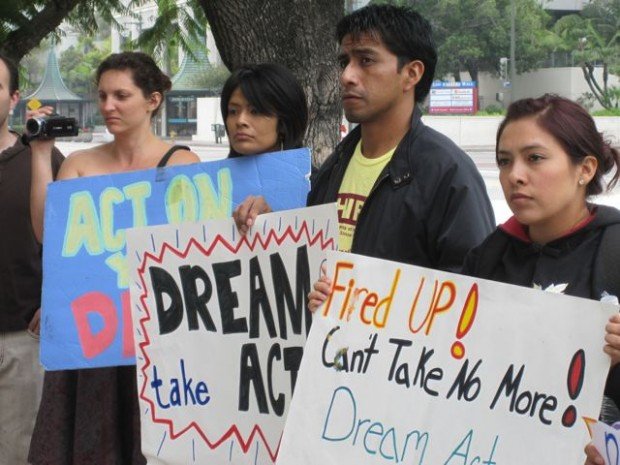President Obama recently said that one of his regrets of his first two years in office was not being able to get the DREAM Act passed. The bill which would create a path to citizenship for children of undocumented immigrants failed in a 55-41 vote in the Senate last week, thereby killing it in Congress for this legislative session. During a press conference, President Obama said he hoped to make the bill a priority for the first part of 2011.
The DREAM Act would enable those with no criminal record who promise to dedicate two years to the military or higher education to obtain permanent resident status. There are an estimated two million undocumented youths in this country, and the Migration Policy Institute calculated that around 850,000 people would benefit from the DREAM Act. Every year, an estimated 65,000 undocumented young people graduate from high school in the United States.
“My administration will not give up on the DREAM Act, or on the important business of fixing our broken immigration system,” said Obama during his last press conference of the year before heading to Hawaii to spend time with his family for the holidays.
However, he faces an uphill battle.
Many who follow this issue, rightfully or unjustly so, call it a backdoor amnesty program. Under the law, once the beneficiaries of the Dream Act gain legal status, they could use the current Immigration laws to petition for their relatives to also become permanent residents.
The DREAM Act could also lend to an increase in the Democratic voter base, so it should come as no surprise that many Republican lawmakers are against the act. If the Act were to pass, one could argue that more Latino Americans would vote Democrat and those children granted legal status would eventually become voters who would vote Democrat as well. This type of partisan reaction has already been demonstrated by many Cuban Americans who benefited from lenient immigration and asylum laws under Republican administrations and therefore vote Republican.
Because there may be political ramification for making such announcements, several lawmakers who oppose it say they will not support the act unless the administration does more to ensure stricter border controls. Without pairing strict controls, there is the perception that those overseas may attempt to enter the United States at a higher rate in hopes they too would eventually qualify for clemency.
Just as some perceive this Act as an attempt at amnesty, it can also be used as a mechanism for sending people back to their countries of origin. Under current immigration law, anyone who has lived in the United States unlawfully for between six months and a year is barred from residency in this country for three years. That bar increases to 10 years for anyone who has resided unlawfully in America for one year or more.
By the same token, if a child eligible for residency under the DREAM Act were to petition for a parent to also attain residential status, that parent would have to be residing in their home country to qualify for the visa. The parent would also need to have an interview with an immigration official at a U.S. Consulate Officer in his or her home country, thus necessitating a departure from the United States in order to return to the country for more permanent residency.
Looked at another way, the Act would also be a method of getting many here in this country without status to return home. While many Americans support the spirit of a bill to assist children who had no control of the situation they were brought into, still many dislike the idea of U.S. Taxpayers subsidizing the college education of citizens of another country. It is a delicate issue because there are those who look at the thousands, if not millions of American children who do not go to college because they cannot afford to pay for it, or who go to college and cannot qualify for aid and have to work to pay for their education.
Jay Jay Ghatt is also editor at Techyaya.com, founder of the JayJayGhatt.com and JayJayGhatt.com where she teaches online creators how to navigate digital entrepreneurship and offers Do-It-For-You Blogging Service. She manages her lifestyle sites BellyitchBlog, Jenebaspeaks and JJBraids.com and is the founder of BlackWomenTech.com 200 Black Women in Tech On Twitter. Her biz podcast 10 Minute Podcast is available on iTunes and Player.fm. Follow her on Twitter at @Jenebaspeaks. Buy her templates over at her legal and business templates on Etsy shop!



